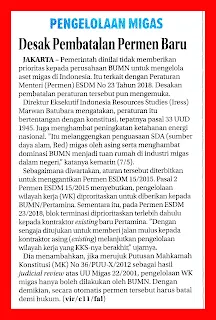Private oil and gas contractors will get the right of participation
Ministry of Energy and Mineral Resources (ESDM) will start applying Regulation of Minister of Energy and Mineral Resources No 23/2018 on Management of Oil and Gas Working Areas Ending Contract of Cooperation. Ministry of Energy and Mineral Resources this week will sign a contract extension of four blocks of oil and gas to contractors who are currently managed by existing contractors.
According to the new EMR Minister Regulation, all contracts that will be exhausted will be given to the existing contractor. So it is not given 100% to PT Pertamina. There are four oil and gas block contracts that expire next year. Fourth. the oil and gas blocks are Jambi-Merang Block managed by Joint Operating Body (JOB) Pertamina-Talisman Jambi Merang, and Pendopo & Raja block managed by JOB Pertamina-Golden Spike Energy Indonesia. Then Blok Bula is managed by Kalrez Petroleum (Seram) Ltd, and Seram Non Bula with operator Citic Seram Energy.
Deputy Minister of Energy and Mineral Resources (ESDM) Arcandra Tahar revealed that the government wants to immediately decide the management of oil and gas blocks that will expire contract and this week will also soon be signed a new contract termination region.
According to him, the existing contractor in the block that expired in 2019 contract will get the right of participation or participating interest. This is in accordance with Minister of Energy and Mineral Resources Regulation No 23/2018.
"We follow according to the Minister of Energy and Mineral Resources Regulation," said Arcandra.
Director of Upstream Oil and Gas Business Development Ediar Usman added that ESDM Minister Ignatius Jonan is planning to set the termination block management by 2019 this week. According to him, the four termination blocks can be processed first because the Contractor of Cooperation Contract (KKKS) (KKKS) in each oil and gas block has bid to the government.
Although it will be decided this week, the government is still negotiating the four oil and gas blocks terminated in 2019. In the decree, the ESDM Minister will set the amount of participation rights for blocks managed by two KKKS, terms and conditions or terms and conditions (T & C), signature bonus (signature bonus) to a certain commitment.
"Friday, May 11, set by the Minister," said Ediar.
Instead Marwan Batubara Executive Director of Indonesian Resources Studies (IRESS) asked President Joko Widodo to immediately cancel the Regulation of Minister of Energy and Mineral Resources No. 23/2018. His argument, the rule is contrary to the constitution of Article 33 of the 1945 Constitution, inhibits the increase of national energy security and sustaining the control of oil and gas by foreign parties.
"The most important thing is to reduce the potential revenue of the oil and gas sector," he said.
The enactment of the Ministerial Regulation also hampered the dominance in the country itself and showed the inferior attitude of the Indonesian nation in the presence of other nations in the world.
"This Regulation of the Minister of Energy and Mineral Resources provides a smooth way for foreign contractors (existing) to continue working area management (WK) whose contract expires," he said.
IN INDONESIA
Kontrak Blok Terminasi Tahun 2019 Siap Ditanda tangani
Kontraktor minyak dan gas swasta akan mendapatkan hak partisipasi
Kementerian Energi dan Sumber Daya Mineral (ESDM) akan mulai menerapkan Peraturan Menteri ESDM No 23/2018 tentang Pengelolaan Wilayah Kerja Migas yang Berakhir Kontrak Kerjasamanya. Kementerian ESDM pekan ini akan menanda tangani perpanjangan kontrak empat blok migas kepada kontraktor yang selama ini dikelola kontraktor eksisting.
Menurut Peraturan Menteri ESDM baru tersebut, semua kontrak yang akan habis akan diberikan kepada kontraktor eksisting. Jadi tidak diberikan 100% ke PT Pertamina. Terdapat empat kontrak blok migas yang habis tahun depan. Keempat. Blok migas tersebut adalah Blok Jambi-Merang yang dikelola oleh Joint Operating Body (JOB) Pertamina-Talisman Jambi Merang, dan Blok Pendopo & Raja yang dikelola oleh JOB Pertamina-Golden Spike Energy Indonesia. Lalu Blok Bula yang dikelola oleh Kalrez Petroleum (Seram) Ltd, dan Seram Non Bula dengan operator Citic Seram Energy.
Wakil Menteri Energi dan Sumber Daya Mineral (ESDM) Arcandra Tahar mengungkapkan, pemerintah ingin segera memutuskan pengelolaan blok migas yang akan habis kontrak dan pekan ini juga akan segera ditandatangani kontrak baru wilayah kerja terminasi.
Menurut dia, kontraktor eksisting di blok yang habis kontrak pada tahun 2019 itu akan mendapatkan hak partisipasi atau participating interest. Hal ini sesuai dengan Peraturan Menteri ESDM No 23/2018.
"Kami ikuti sesuai Peraturan Menteri ESDM," kata Arcandra.
Direktur Pembinaan Usaha Hulu Migas Ediar Usman menambahkan, Menteri ESDM Ignasius Jonan memang berencana akan menetapkan pengelolaan blok terminasi tahun 2019 pada pekan ini. Menurut dia, keempat blok terminasi tersebut bisa diproses lebih dahulu karena Kontraktor Kontrak Kerja Sama (KKKS) (KKKS) di masing-masing blok migas tersebut telah mengajukan penawaran ke pemerintah.
Meski akan diputuskan pekan ini, pemerintah masih melakukan negosiasi keempat blok migas terminasi tahun 2019. Dalam keputusan tersebut, Menteri ESDM akan mengatur besaran hak partisipasi untuk blok yang dikelola oleh dua KKKS, syarat dan ketentuan atau terms and conditions (T&C), bonus tanda tangan (signature bonus) hingga komitment pasti.
"Jumat tanggal 11 Mei ditetapkan Pak Menteri," ujar Ediar.
Sebaliknya Marwan Batubara Direktur Eksekutif Indonesian Resources Studies (IRESS) meminta Presiden Joko Widodo segera membatalkan Peraturan Menteri ESDM No 23/2018. Argumennya, aturan itu bertentangan dengan konstitusi Pasal 33 UUD 1945, menghambat peningkatan ketahanan energi nasional dan melanggengkan penguasaan minyak dan gas oleh pihak asing.
"Yang terpenting mengurangi potensi penerimaan negara sektor migas," katanya.
Pemberlakuan Peraturan Menteri juga menghambat dominasi di negeri sendiri dan menunjukkan sikap inferior bangsa Indonesia di hadapan bangsa-bangsa lain di dunia.
"Peraturan Menteri ESDM ini memberi jalan mulus kepada kontraktor asing (eksisting) melanjutkan pengelolaan wilayah kerja (WK) yang kontraknya berakhir," ungkap dia.
Kontan, Page-14, Tuesday, May 8, 2018














